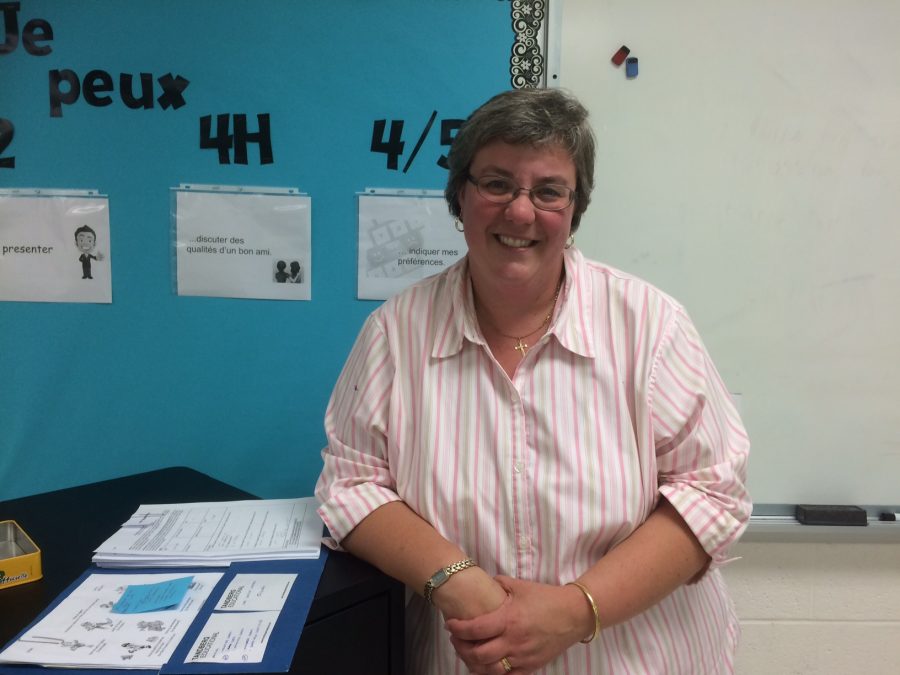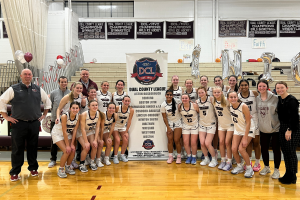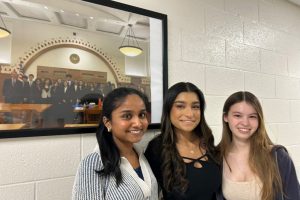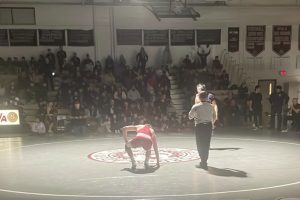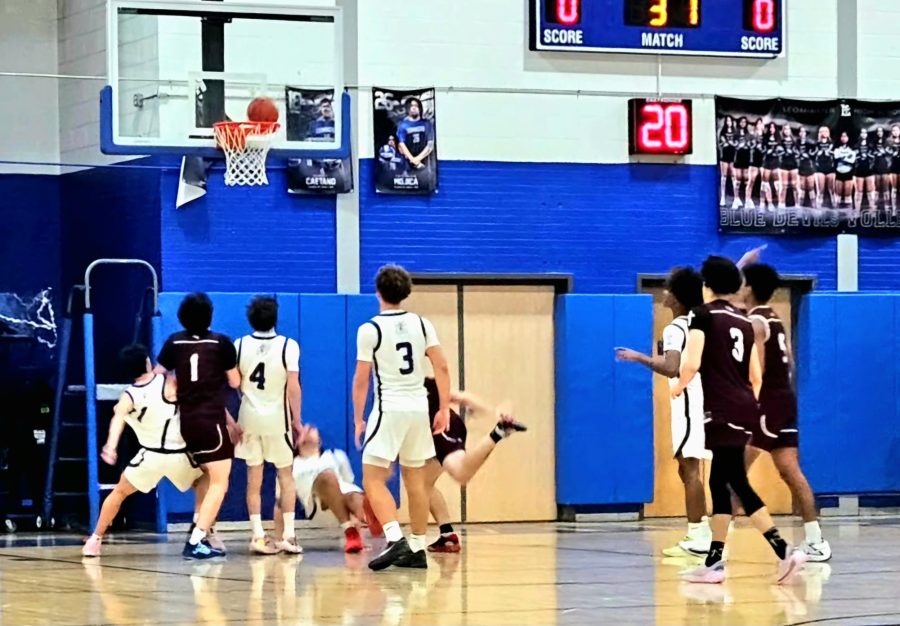Madame Charbonnier welcomed to Westford
October 11, 2016
The 2016-2017 school year welcomes a host of new educators to the building, including French teacher and world language curriculum coordinator Sharon Charbonnier.
Q: How would you describe your first weeks at WA?
A: They have been very welcoming. They have been very fun-filled, there’s such a great atmosphere here and overall just a great experience.
Q: How does it differ from other places you’ve worked in the past?
A: I worked in a middle school for nine years, so clearly the grade levels are different, and I worked at Chelmsford high school before. High schools each have their own culture and it’s really hard to compare because you’ve got different students, you’ve got different types of classes, you’ve got different expectations. I would say you can’t compare apples and oranges, but I loved my last school, both the middle school and the high school and I love this one as much.
Q: What drew you specifically to Westford?
A: I love the community. I have a lot of friends that send their children here and that are active community members here– there’s that level. In terms of the school itself, the fact that there are five languages offered here at the high school and four at the middle school. I love languages and I think that is so important in the school as well as society to have all those choices and it’s just a benefit that I hope the students appreciate. That’s definitely the biggest draw.
Q: Building off of that, what drew you to the high school age?
A: As coordinator, some of it is it being logistically easier to be at the high school, but with the high school kids there’s a maturity level that middle school students don’t have. Middle school students have the excitement, because it’s all brand new, they’re still bubbly, but with high school students there’s a maturity. They appreciate and they really want to explore options just beyond the classroom setting. In Westford in particular I find that they really value that and that fits right in with languages. I think it’s really great.
Q: How long have you been teaching or working in schools?
A: This is my nineteenth year teaching. Actually, it’s my nineteenth year in public schools but I was six years at the university level before that, probably twenty-five.
Q: What did you do at the university level?
A: It was while I was working on my masters and I had begun my doctoral studies they have TAs or teaching assistants. When you’re a language person most TAs teach classes. Once I’d done my introductory work with a professor, they actually gave me my own advanced grammar sections, conversation sections. And then at UMass Amherst I was the assistant director for a couple years and then the onsite director for a final year– I lived in France. I got to work with the UMass students who had chosen to do a year abroad. It was unofficial teaching. It wasn’t like a full professorship, it was just a teaching assistant, but I was able to work with students living abroad as well as on campus.
Q: You were located in France?
A: I lived there [for] three years, yes. As their onsite assistant-director for two years and on-site director for a third year working with Umass students in the year abroad program.
Q: How was that?
A: It was awesome because clearly, that’s how you get fluent in the language: by living in the country. And then I was able to help the students learn the language, learn the culture, because they were living in it 24/7.
Q: Was that your first time in France?
A: Nope, that was actually my second time. I had gone when I was in college. But when I was with UMass, I was up in the north, in Normandy, and the first time I went to France when I was in college I was in the south.
Q: Is there a language difference between the North and South regions of the country?
A: In terms of accents, yes. It’s like the difference between the south and California There are differences, but the language is the same.
Q: What drew you to teaching originally?
A: I kind of fell into it. I had always done lots of babysitting, working at camps and things, so I loved working with kids, but when I started my graduate studies, I chose languages because I wanted to work internationally. I absolutely adored teaching students and seeing their “I get it” moments. They were able to use something that I had taught them and I fell in love with it then.
Q: You talked a little bit about your time in France as well as your education, what preparation did you go through to have the position you have now?
A: I started studying when I was twelve like most students do. They (French students) start in sixth or seventh grade, and I loved it. I had great teachers all the way through that definitely motivated and inspired me. In college as a french major and a political science major, I had professors that inspired me, I got to travel, I had the opportunity to live in the country, and meet a variety of people. When you’re working with your peers and colleagues, you teach each other, and so the philosophy I use in the classroom is really what I try to use as a coordinator. They both just fit together.
Q: What was one of the most memorable moments that you’ve had with the language?
A: When I was learning, I would definitely say the first time I was able to read a novel and actually talk with my teacher about it all in French. That was kind of like a first “aha” moment. Then, when I was teaching, one of the most remarkable moments was last year when one of my AP students was giving a speech to a French group, a club in Lowell, all in French and he was talking about how he started in seventh grade and now he could give a speech about technology in French. There was a group of exchange students at our school and he was actually able to converse with them the way that he was able to converse with his peers in English. To see that happen and know that I had helped him get there, it’s just very powerful.
Q: What book was it that you were able to read?
A: Satre, Jean Paul Satre who’s a famous existentialist. Les Jeux Sont Faits,“The Bets are Closed.”
Q: Moving away from the French teaching aspect of your job, could you tell me a little bit about your responsibilities as curriculum coordinator?
A: As the coordinator you have your hands in lots of different activities. There’s definitely ensuring that the curriculum is well aligned to national expectations and state expectations. It’s ensuring that students in all the languages have similar yet different experiences. They’re different languages, yet they’re all going to get the same types of skills, they’re all going to be able to use the language outside the classroom and that’s the ultimate goal, the communication piece. It’s working collaboratively to figure out exercises and activities and assignments. THings that are going to be relevant to learning language as well as learning how to speak it. It’s both learning through the language, learning about the language, and putting all those pieces together. That’s the main piece. And then helping colleagues improve their practices because as teachers, you don’t just do something once and then you’re set. You’re always improving, you’re always finding new ways to do things. We teach each other, ensuring that those opportunities happen. You’ve got the clerical type stuff too, you just keep track of what documents need to be done when, but it’s mostly working with the teachers and making sure that everything’s going the way it’s supposed to.
Q: Outside of school, do you have any hobbies that you’d like to share with the students.
A: I travel a lot. My husband’s from France so we get the chance to go to Europe. This summer we spent almost a month traveling through France from the North down to the Alps, through Switzerland. We try to travel as much as we can.
Q: Do you have anything else you’d like to add?
A: I just want to give a shout-out to my students. They’ve been outstanding.

